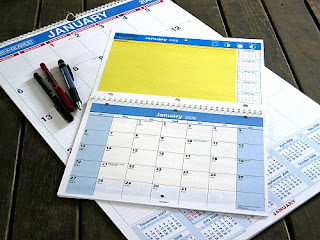I started noticing leaves falling just the other day. Halloween decorations have just begun to take up space at local craft stores. My cousin called to remind me that he was looking forward to his annual Midwest pilgrimage, my sister’s Thanksgiving Food Festival. And extra filler has been showing up in my mail box; solicitations for holiday giving. Ah yes, fall is upon us.
Basically, I think autumn rocks. I love the cooler weather, the clear and crisp skies. I can even appreciate changes in my food cravings from fresh berries to comfort food. (Did someone say turkey chili?)
The content of my mailbox, though, sets off a bit of a reaction in me. It’s not that I don’t value giving. I do. But, charities can package some pretty useless items as part of their pitch. Return address labels (in large quantities), overly religious holiday cards, ball point pens, magnifying glasses, clocks, calculators and calendars.
Some years, I have easily collected over a half dozen calendars. Along with requests to donate, I have received calendars with pictures of nature from Easter Seals, calendars with photo galleries of grateful children receiving aid from the Red Cross, and calendars that marked each month with a not unfamiliar campus location from the Knox College Alumni Association. My annual fall collection of calendars will also include one displaying Chicago street scenes (sent from my car repair shop), one with pics of precious puppies and kitty cats (from the Anti-Cruelty Society), and a few fist sized, magnetized, year-at-a-glance versions, gifted by a local dry cleaner and some real estate agents.
As I’ve sorted my mail lately, I had to recognize I was getting irritated with my calendar-copia. Why? Was this just a case of too much of something? Do calendars make me look at things I’d rather not look at like the passage of years?
I recalled other associations I had with calendars. Calendar montages flickered through my mind like transitional scenes in old movies. I pictured the squares containing the dates being Xed out like you’d see in a prison or war movie where the hero would be counting the days until his next parole hearing or scheduled date to return stateside. Then, in black and white blurs, I saw the pages fall away.
As I thought more about calendars, I zeroed in on the idea of feeling “boxed in.” I think the simple grid of a calendar page, with clearly delineated borders, somehow reinforces the downside of making commitments. Dates have timeframes and choices have consequences. Once you select a date for something, you’ve eliminated other possibilities, other choices, for that time period.
I also thought about the upside of commitments; how much I appreciate it when someone makes a date in advance to do something with me. I request this kind of consideration because it increases the likelihood of a desired event actually happening. If I want to have lunch with Valerie or Donna, I wouldn’t expect to just run into them. To me, making dates shows respect for another person’s time and respect for your own time because it frees you to plan your life around your priorities. Keeping commitments is a foundation for relationships.
It’s important for me to have freedom and spontaneity in my life. It’s also important for me to feel that my time is being respected. I want to treat my time as the valuable commodity that it is, and I want to be seen as dependable and trustworthy by others.
Calendars are unpaid assistants that help me fulfill my intentions, and that’s no small thing.



Leave a comment